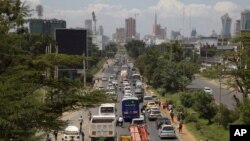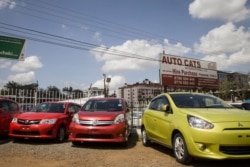A United Nations report finds millions of substandard cars that pose safety, health and environmental hazards are exported every year from developed countries to developing countries, largely in Africa.
The U.N. Environment Program reports 14 million used cars, vans and minibuses were exported worldwide between 2015 and 2018. Some 80% went to low- and middle-income countries, with more than half going to Africa.
The report says millions of used vehicles exported from Europe, the United States and Japan to the developing world are of poor quality and a major contributor to air pollution and climate change.
The International Energy Agency reports today’s global 1.1 billion light-duty vehicles are expected to double by 2050. UNEP Executive Director Inger Andersen said much of this growth will be fueled by imported used vehicles by developing countries.
“But the current wave the used vehicle market operates means that developing countries, particularly in Africa serve as, I will say, the dumping ground of cars that are no longer considered safe enough or clean enough for developed countries," Andersen said. "This is an issue of fairness, of respect and of equity. And, also of course, a major concern for health, both human and environmental.”
The World Health Organization reports about seven million people die prematurely each year from air pollution. Andersen said air pollution will continue to rise and the continued export of used vehicles into developing countries will hinder their efforts to reduce greenhouse gas emissions.
UNEP finds used vehicles exported into developing countries are generally unsafe and responsible for an epidemic of road accidents. WHO calls sub-Saharan Africa the global capital for road traffic deaths. It reports Africa accounts for 26.6 deaths per 100,000 accidents compared to 9.3 deaths per 100,000 in Europe.
Andersen said UNEP is not calling for a complete ban on the export of used vehicles to developing countries. But she said the market should be regulated in both developed and developing countries. She adds developed countries must stop exporting vehicles that fail environment and safety inspections and are no longer considered roadworthy in their own countries.
“Scrap vehicles belong to be scrapped and recycled and repurposed and not in a market where they pose danger, environmental hazards as well as road hazards,” Andersen said
The report finds a number of African countries already have put in place minimum quality standards, including Morocco, Algeria, Ivory Coast, Ghana and Mauritius. Last month, it notes the Economic Community of West African States (ECOWAS) set cleaner fuels and vehicle standards from January 2021.





